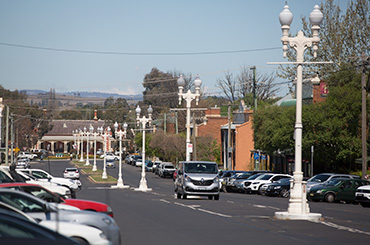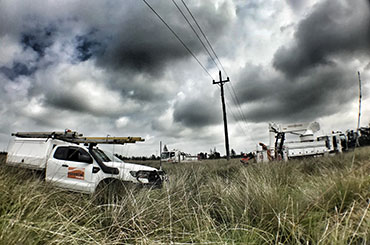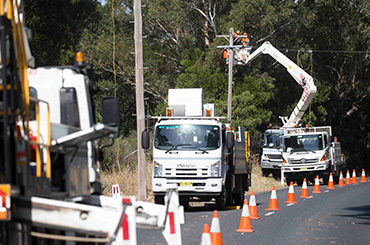
Extreme heat conditions put electricity networks under pressure, with residents and businesses making greater use of electricity to keep cool. At Essential Energy we use a range of strategies to manage this pressure, minimising the risk of power outages affecting our customers. You too can help with simple energy-saving tips and ways to stay cool.
Energy efficiency tips
- during the day, keep heat out by closing doors, windows, blinds and curtains
- at night, let cooler air in by opening doors and windows
- use fans and try to limit use of air conditioners as much as possible
- adjust air conditioners to 24 degrees or warmer
- keep fridges at five degrees and try to limit the number of times you open the door
- switch off lights and appliances – to stop them generating heat as well as saving power.
For more information on energy efficiency, read our advice for the home and for work.
Staying cool
- stay hydrated with water and electrolyte drinks
- wear loose, light clothing and place a damp cloth on your neck
- have a cool shower or bath
- if you live in a multi-story building, stay downstairs where the air will be cooler
- use your stovetop or BBQ outside instead of cooking with the oven, to avoid generating more heat
- if you rely on an electric pump for household water, make sure you have enough stored water in case of a power outage
- plan for how you will manage during extreme heat, including possibly visiting family or friends with cooler homes or visit cooler public buildings.
If you are elderly, have young children or rely on a stable power supply for your health, please make plans to ensure you have alternative arrangements in place should an outage occur. Read our life support page for more information.
Remember to keep your pets cool and hydrated as well.
Safety around powerlines
In hot conditions powerlines can change height, with the metal wires lengthening slightly, causing them to hang closer to the ground. A long powerline only needs to expand by a few centimetres to make a difference to the amount of clearance for vehicles and machinery to safely pass underneath. So, look up to check the height of powerlines before passing under them.
People operating large machinery, including farm, construction and earthmoving vehicles, should particularly take care. Just because a machine passed safely under a powerline last week does not mean it will today. Always check that there is plenty of clearance under powerlines regardless of the weather conditions. Know the height of your machinery and always fully lower machinery before moving. The safest option is to plan a route that avoids overhead powerlines.
If your machinery comes into contact with overhead powerlines stay in the vehicle, if safe to do so, and call us immediately on 132080.
Always stay at least 8 metres away from fallen powerlines and anything in contact with them, and call us to report the fault.
Read our safety pages for more information.
Visit our Summer Safety page for more helpful tips
Planned outages
Throughout the year we undertake planned outages for necessary maintenance and upgrades to our network. During heatwaves our regional teams consider local conditions and assess planned outages on a case-by-case basis to determine whether they can be shortened or rescheduled.
Our network is also impacted by unplanned power outages, often from weather, vegetation and wildlife damaging the poles and wires that make-up the network. When this occurs, our crews work to restore power safely and as quickly as possible.
We thank our customers for their patience during planned and unplanned outages, particularly during extreme weather conditions.
View our current planned and unplanned outages.
Report an unplanned power outage by calling us on 132080 or report it online.
Managing the network
At Essential Energy we work with the Australian Energy Market Operator (AEMO) and TransGrid to actively manage the network to ensure stable and reliable power supply. The AEMO is responsible for operating the National Electricity Market (NEM), which includes our network. TransGrid is responsible for operating and managing the main high voltage transmission network in New South Wales, to which our distribution network connects.
During heatwaves, the AEMO assesses energy security across the NEM and manages supply and demand by providing directives to power generators, transmission network operators like TransGrid and distribution network operators including Essential Energy. This can include directives to proactively manage access to off-peak power when demand is high during the day. Off-peak power is usually available when demand is lower mid-morning, mid-afternoon and overnight. Customers use it for hot water systems and irrigation pumps. In extreme conditions, to help keep the overall network stable, access to off-peak power may be removed during the day. Access is restored in the evening when demand returns to lower levels.
In very extreme circumstances, lack of reserve actions can be implemented by the AEMO. As a last resort, these may result in power outages for short periods of time for Essential Energy customers. They are designed to maintain the supply of stable and reliable power by preventing longer lasting outages from impacting large parts of the network.
Read more



